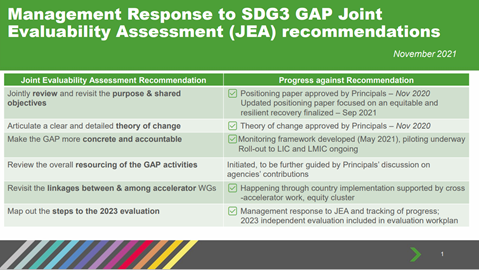Joint Evaluability Assessment of the Global Action Plan for Healthy Lives and Well-being for All (2020): Management response update

Overview
The Global Action Plan for Healthy Lives and Well-being for All (SDG GAP) was agreed in 2018 by 12 global organizations that are working to advance the health-related Sustainable Development Goals (SDGs). The GAP is intended as an opportunity to more effectively leverage the 12 agencies’ individual mandates, comparative advantages and capacity to enhance collaboration and thus accelerate progress on the health-related SDG targets at country level. This joint evaluability assessment (JEA) was commissioned and managed by a coalition of the 12 GAP partners’ independent evaluation offices. Taking a broader approach than traditional evaluability assessments, this JEA sought to not only assess the technical dimensions of evaluability (e.g., the existence of a theory of change, key performance indicators, a monitoring plan), but rather more meaningfully assess the strategic dimensions as well – that is, whether the partnership itself has the elements in place to succeed in achieving its objectives. As an early, rapid, light-touch and formative exercise, the JEA’s objective was to help the partners identify and address any key gaps before issues might become harder-to-address problems later on; its ultimate aim was to help strengthen the partnership itself through a process of joint learning and action, and thereby help maximize the likelihood that this crucial partnership will succeed in achieving its ambitious goals. A management response and update to the JEA’s recommendations have been developed and approved by the GAP signatory agencies’ Principals. It presents the action steps the agencies plan to take to address the gaps identified in the JEA.
